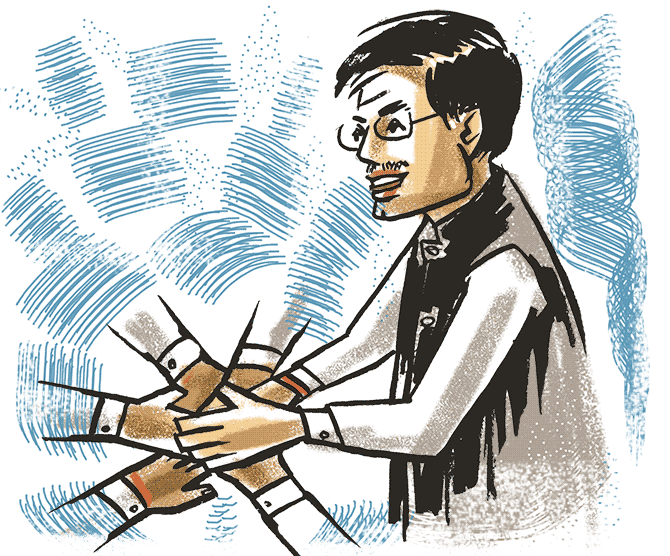The high point of the trip will be Goyal’s meeting with US Trade Representative Robert Lighthizer on November 13, which is expected to see the USTR push India towards lower import duties in a broad range of areas.
Illustration: Dominic Xavier/Rediff.com

Less than a week after pulling out of the Regional Comprehensive Economic Partnership (RCEP) pact, India is set to revisit its trade talks with the United States, which had hit a wall on tariff and market access issues back in September.
During a three-day visit to the US beginning November 12, Commerce and Industry Minister Piyush Goyal will be looking to clinch a ‘mini trade deal’ focused on finding an amicable solution to some of the biggest demands of the US.
The visit gains importance at a time when New Delhi has openly backed a bilateral deal with the US, a significant change in its position.
The US has kept the tempo high on its demand for fewer restrictions on market access for US medical device manufacturers and solar panels, as well as market access for other key products.
Goyal will be meeting Scott Walker, president of AdvaMed, the American medical device trade association which has repeatedly lobbied Washington DC to push India to dismantle its price cap regime for crucial medical devices, said people in the know.
New Delhi had earlier considered allowing a trade margin policy for coronary stents.
However, the high point of the trip will be Goyal’s meeting with US Trade Representative (USTR) Robert Lighthizer on November 13, which is expected to see the USTR push India towards lower import duties in a broad range of areas.
Deal or not
India had earlier prepared plans for a mutually acceptable ‘trade package’ that provides an amicable solution to major grouses from both sides, according to a senior trade negotiator.
Lower duties on import of certain information and communication technology products such as high-end mobile phones and smartwatches from the US had been on the cards, which may make iPhone products cheaper in the country, he said.
A bilateral trade deal has remained a key American demand, which has been repeatedly rebutted by India, up until earlier this year. With Prime Minister Narendra Modi by his side, US President Donald Trump had promised a trade deal with India “very soon.”
The US has stuck to its demands, which include wine and Harley-Davidson motorcycles,” another highly placed source said.
The motorcycle tariffs have led to Trump repeatedly terming New Delhi a ‘high-tariff nation.’ Washington DC also wants India to reverse the higher duties placed on 29 key imports from the US, earlier this year.
New Delhi had announced higher tax ,by up to 50 per cent on import of agri goods like apples, almonds, walnuts and some industrial products.
The new taxes are proposed to rake in an estimated $240 million worth of additional taxes, and India has claimed the amount was equal to the estimated loss faced after the Trump Administration imposed a 25 per cent extra levy on steel, and 10 per cent on aluminium products from many countries, including India in May, 2018.
Low returns
In return, the US has offered to step back from its aggressive posturing on ‘reciprocal taxes.’
While the US has not targeted India specifically yet, it has dropped repeated hints saying tariffs on Indian imports could be raised similar to those on Chinese products.
The upcoming meeting would be the first meeting between both sides after a crucial World Trade Organization (WTO) ruling was delivered against it.
Subsequent to a US complaint, the WTO had investigated and ordered New Delhi to stop all of its current export promotion schemes within the next four months.
The WTO also said the SEZ Scheme should be closed within the next six months.
However, the government is set to argue against it.
It was not immediately sure if India would petition the US to reinstate its trade benefits under the Generalized System of Preferences (GSP) program to Indian exporters.












 © 2025
© 2025